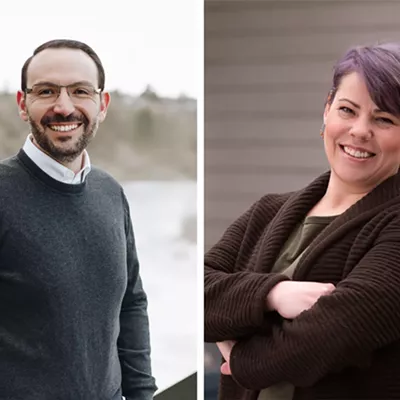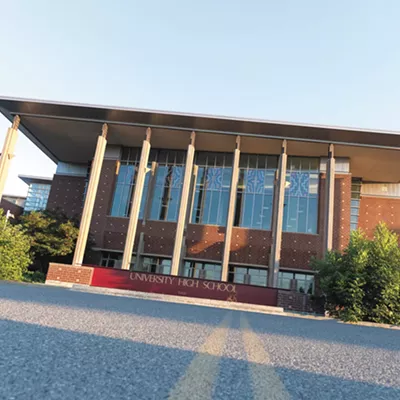Back in 2003, when President Bush's poll numbers were high and the mission in Iraq was reportedly accomplished, the White House's plan was hatched. George Nethercutt would defeat Patty Murray and shift the balance of power in the U.S. Senate decisively to the GOP. As for the seat Nethercutt would leave? Hey, it's the 5th District -- they don't get much more reliably conservative than that one. Well, nobody planned for Don Barbieri.
With three Republicans duking it out for the chance to face him in the general election, the former CEO of WestCoast Hospitality has been able to polish his message and fill his war chest -- in part with $350,000 of his own money.
"I'm not asking anybody to do something that I'm not willing to do myself," he says of his pledge to match campaign contributions up to the federal limit.
If you're Karl Rove, Barbieri is the last person you wanted to face: successful, articulate, homegrown and on the conservative end of the Democratic spectrum (he even supports the Second Amendment, the issue that tripped Tom Foley in '94).
"Why would a CEO of a publicly traded company leave all that to enter the crossfire of politics?" he asked me a few weeks ago as we drove between campaign stops. It's a good question for a 58-year-old business executive: Isn't he supposed to be retiring to a golf course someplace warm?
"I want my grandkids," Barbieri quickly answered, "to have the same opportunities I did."
These are the kinds of words that routinely come out of candidates' mouths this time of year. Invoking the grandkids -- and he has three -- is a clich & eacute;, but Barbieri sells the line. He's got an earnest kind of optimism to him; apparently he avoided having the idealism stomped out of him for all these years. Maybe it's easier to maintain a sunny disposition when you're a CEO, living large and calling all the shots.
But Barbieri didn't grow up wanting to be in charge of a publicly traded corporation. In fact, he was studying to be an urban planner at the University of Washington when he was called home to join the family business. One of the partners died suddenly, and Barbieri settled into a desk a few steps away from his father's. He worked with his dad, Lou, for more than 30 years. In that time, Goodale & amp; Barbieri, a sleepy real estate management firm with five employees, grew to become WestCoast Hospitality, a Spokane-based company that owns hotels and a ticketing operation spread across 30 states and employing 5,000 people.
His local roots run deep; his great-grandparents homesteaded in North Idaho in the 1880s. And Barbieri recalls growing up on Spokane's South Hill in a family of seven brothers and sisters. "We didn't have any money," he says, adding that entertainment consisted of running around the neighborhood until the streetlights came on: the nightly signal that his mother's curfew had begun.
As the business grew, he found time to be active in civic matters. He has served on the state's Economic Development Commission under three governors, and he was president of the Spokane Area Chamber of Commerce, when he worked on issues like keeping Fairchild AFB open and creating the state's most widely used community empowerment zone as a way to combat poverty.
But even at WestCoast, he managed to do things a little differently. The company developed its own health insurance plan, established a daycare center and built 1,500 units of affordable housing. At one point, his company bought a failing dairy farm and turned it into the Broadview Dairy, which is now employee-owned and thriving.
As for legislative experience, he has none. But as he sees it, Congress needs more people like him. "As a businessman, I know where we need government, and where government is just in the way," he says. He plans to attack public problems with a "toolbox" right out of Wall Street. He talks about the region's "brand identity," for example, and he's big into visioning and long-range planning.
Out on the campaign trail, Barbieri's corporate background, his wonkish devotion to policy-talk and his "conservative Democrat" profile make for an unusual blend. As with the Democratic Party in general, he doesn't say much more than he needs to say. Then again, at the Blue-Green Coalition Picnic on Aug. 18 at Plantes Ferry Park in Spokane Valley, the 80 or so in attendance didn't need the Al Sharpton treatment to get fired up about this election.
"Blue" refers to steelworkers, while "green" is for environmentalists, and efforts are underway in a handful of states to link the two interest groups.
Rein Attemann, forest watch coordinator for the Lands Council, takes a shot at describing the link to me in his best this-is-how-to-talk-to-a-reporter cadence. Finally, after saying all the right things, he leans in close and adds, "Off the record, the environment and labor are getting screwed." When I encourage him to share such a pithy observation with readers, he adds, "If you can put 'screwed' in there, fine."
You don't have to ask which color Richard Babcock represents; his black T-shirt with cut-off sleeves reveals the kinds of biceps you'd expect on a steelworker. His worn workboots also offer a plain contrast to the Birkenstocks on some of the others in the crowd. Babcock retired from Kaiser Mead after 35 years, just before the closing of the smelters; his wife has good health insurance, but he has a lot of close friends who have been hit hard.
Babcock says he doesn't share many of the environmentalists' concerns, but thinks anything to draw attention to the plight of working people is good.
"To give a corporation a tax break for moving out, I never believed that would happen in my lifetime," Babcock tells me. "We can't afford another four years of this," he concludes, as he watches Barbieri pressing the flesh nearby. "People better open their eyes."
Barbieri, in khakis and a white polo shirt, gives a brief speech to the crowd: "Our brand for success in the future is an environment that is second to none in the world. And that environment is going to be why families and companies will come to the Inland Northwest."
He doesn't mention George W. Bush or the war in Iraq. His only applause line comes when he says the nation should wean itself off foreign oil.
Soon, we're off in the campaign's Lincoln Navigator, headed for a small gathering out off of Indian Trail Road.
Barbieri's a talker and is very well versed in the issues facing the district. On the 20-minute ride, he describes them in rapid succession. There are 96,000 uninsured people in the 5th District, and three-quarters of those uninsured who are adults have jobs. Of every dollar spent in health care, 41 cents go to bureaucracy. Only 20 percent of the district's 9th graders ever graduate from college.
A lot of the solutions, he says, can be found through targeted tax breaks, by "bringing people around a table who don't like each other" and by planning for the next five years instead of the next five minutes. But again, no Iraq. No Bush. Could it be that the poobahs of political polling have told him to tone it down? In an election season that will essentially be a referendum on George W. Bush, choosing to discuss health care might seem a bit calculated.
A few days later, in his office overlooking the Spokane River, he defends his priorities: "No, Iraq isn't high up on my stump speech. Everywhere I go in the 5th, the No. 1 issues are health care and jobs. I was doorbelling over the weekend, and it was health care, health care, health care. I've got to bring these people a solution on health care."
And health care does come up as a question at the home of Kandys and Hank Dygert out off Indian Trail, where 10 neighbors gathered to hear Barbieri's pitch. But Iraq comes up, too.
Barbieri tells the group he won't look back and second-guess the decision to go to war. The neighbors' talk turns bitter, to how gas is cheaper in Iraq and how we're building schools there, to which Barbieri replies: "We've got a nation to build right here."
Like voters across the country, perhaps, the group seems to know in their heads that health care should be the top issue in the race. But their hearts, it seems, are tugged by the urgency of Americans at war. Barbieri's comment is met with nods of approval -- after all, "We've got a nation to build right here" is a heck of a soundbite. But don't expect to hear him repeat it much. Clearly, Barbieri doesn't want the fog of war to color voters' perceptions of him, so like any Democrat trying to sway some Republicans, he's playing it safe.
His background as a CEO can cut both ways. Hank Dygert, a football coach at Ferris High School, takes advantage of having a real captain of industry in his own back yard to share his feelings about Wall Street. With quiet indignation, Dygert says he feels something has gone horribly wrong in corporate America, especially in the Enron fiasco. Barbieri defends "all the really good companies in this country" while Dygert goes on to wonder what it will ever take to put a rich and powerful crook in jail.
So can Barbieri -- by his own description, a kinder, gentler CEO -- save the country from those other CEOs? This congressional race isn't that simple, but Barbieri has to hope the 5th District sees it the way Dygert does. "You understand business," he tells Barbieri as the event winds down, "but you reflect our values."
Barbieri On The Issues:
HEALTH CARE
As chairman of the Sacred Heart Medical Center Board of Directors from 1988-91, Don Barbieri saw the problems facing the health care industry from the inside.
Barbieri says the uninsured are a massive drag, as they receive charity care that is paid for by everyone else. To get more people insured, he'd like to see tax credits for companies that fund coverage to their employees. How would he pay for that? He says the savings could be realized easily if the government would use its buying power to negotiate better prices on Medicare drugs. As for the high cost of medical litigation, he says he would focus on weeding out bad doctors, and he would require lawsuit-happy lawyers to earn a formal certificate of merit on any legal action before it could be filed.
JOBS
"I've grown jobs my whole life in the Inland Northwest," says Barbieri, pointing to his own company's growth.
He says the job growth in America is coming from small companies, not big ones, so he thinks the incentives should favor small businesses. Specifically, he'd like to see a new law that allows investors to avoid capital gains taxes on investments in small startups as long as they don't cash out their stock for five years.
LIFE ISSUES
Barbieri is pro-choice, and he supports stem cell research. "We need to give our scientists the opportunity to have breakthroughs in solving these diseases," he says.
IRAQ
Barbieri says whoever wins the White House will have to go back to our allies for help in finishing the job in Iraq. The cost in dollars and lives is becoming too great a burden to bear.
"When you're tearing down a prison and you're rebuilding a prison in Iraq," he says, "and you're refusing to rebuild a veterans' hospital in Walla Walla that serves three states and nine Native American nations, it couldn't be clearer that our commitment to Iraq is withdrawing resources from our own country."
Even though he'd like to see American soldiers come home as soon as possible, he believes the United States must project strength: "We have to send the signal around the world that we are a safe country, and we will not tolerate having our safety challenged."
THE PATRIOT ACT
Barbieri calls the Patriot Act "a quick, knee-jerk solution" to the attacks of 9/11.
"When I talk to [people at] Whitworth College, Gonzaga, WSU, community colleges, whose phone systems, library systems, Internet systems all are now subject to the Patriot Act provisions of potentially tracking student uses -- it's wrong," he says.
He'd like to retire much of the act, while providing law enforcement and Homeland Security officers with the tools they need. As an example, he points to UPS delivery drivers who have satellite-linked communications systems, while Border Patrol agents still struggle with outdated technology to protect the nation.
FAITH
Barbieri went to Catholic grade school (St. Augustine's), high school (Gonzaga Prep) and college (Santa Clara), yet he is reticent about advertising his faith. "I just think you should walk the talk," he says.
He has led a faith-based medical center (Sacred Heart), built affordable housing for a variety of area congregations and, as a college student, he even helped create the Santa Clara Action Program, an outreach program that still exists.
While pro-choice Catholics have come under fire, Barbieri says he will stick with his principles.
ENVIRONMENT
Barbieri sees a clean environment as the "brand" that will distinguish the 5th District. While in the leadership of the Spokane Area Chamber of Commerce, he helped win funding -- from Boise, Olympia and D.C. -- for a major study of the aquifer, to accurately gauge how much growth the water supply can support.
SAME-SEX MARRIAGE
"I believe marriage should be defined as between a man and a woman," says Barbieri. "That's how it's defined in this state."
As for creating a constitutional amendment to make that description the law of the land, he adds, "I have serious reservations about the Constitution being used in a manner that denies individual rights -- to create discrimination."
FEDERAL DEFICIT
Barbieri wonders what the country could do with $1 billion a day. That's how much is being spent on interest to keep up with the $7 trillion debt. As a CEO, Barbieri says he is familiar with taking on debt, but he's also familiar with retiring it.
"I'm a believer in that when we borrow money, we have to have a plan to pay off that debt," he says, "and not simply offload it to our kids and our grandkids."
He blames the severity of the debt on the tax cuts for the wealthiest Americans -- a group he belongs to. "I've been in that tax cut, and I don't need it," he says. "I want to give it back."
























